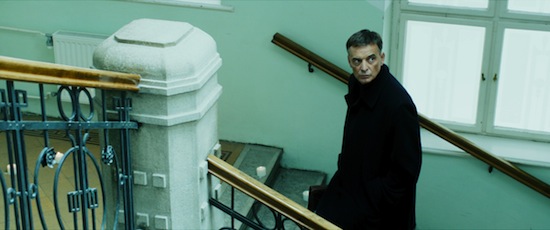"I've learned that people will forget what you said, people will forget what you did, but people will never forget how you made them feel." -- Maya Angelou
Most of us have come in contact with someone who changed the course of our life, at some time or other during our school years. Yet it may not always be the most lovable, kindest professor who had the biggest impact on our choices, career or how we turned out. Sometimes, hidden within the hard shell of the strictest disciplinarian or the most critical teacher, lies the key to our success. Personally, to all those who provoked and challenged me I owe my gratitude, because trying to prove someone wrong can be incredibly creative.
In his latest film Class Enemy, Slovenian filmmaker Rok Biček explores the impact an unlikable teacher has on his German class. When one student commits suicide, the abyss of generational distrust and miscommunication divides Robert, the teacher, played by the stoic and at times gloriously unpleasant Igor Samobor, from his pupils. The result brings the audience on a journey of self-discovery, lived right along with the students' and guided by their insightful teacher.
The story is based on true events Biček experienced in grammar school, when, he says "a third-year girl committed suicide [and] this was followed by a spontaneous rebellion by her classmates, against the school system and teachers." But at the center of his masterful film, which blends cool tinted cinematography with impulsive acting and important themes, lies not the reason for the girl's suicide, rather an interpretation of what he calls "the classic pattern of revolutions, which need a common enemy to bring the group together."
The teacher then becomes this catalyst, a means for her classmates to deal with unresolved feelings, unspoken words and their inability to truly comprehend the reasons for the tragic act. Instead of dealing with the grief, they unite and externalize their anger, finding a common "enemy" in Robert.
The film struck me in its brilliance, perhaps because it steers clear of taking sides. At times I felt for Robert, at others I utterly hated his character, particularly in a scene when he emotionally humiliates a fellow, female, teacher. It's exactly this lack in him of our human desperation to be liked that intrigued me and I was not disappointed by how the filmmaker dealt with the complex quality. At one point, Robert quotes Thomas Mann to a student who has recently lost his mother "A man's dying is more his survivor's affair than his own" which of course is at once incredibly insensitive and profound.
Within the message of the film, that the duty of an educator is to grow us into something better and not necessarily to be liked, I found clues to our own human existence. These days, we are obsessed with being politically correct, saying the right thing, being popular, and yet it's only those who transgress and break the rules who end up being responsible for the most positive changes in the world. Even at the cost of being outcasts.
Class Enemy screened in the Venice Film Festival as part of the International Critics' Week line-up.
Image courtesy of Triglav film, used with permission

